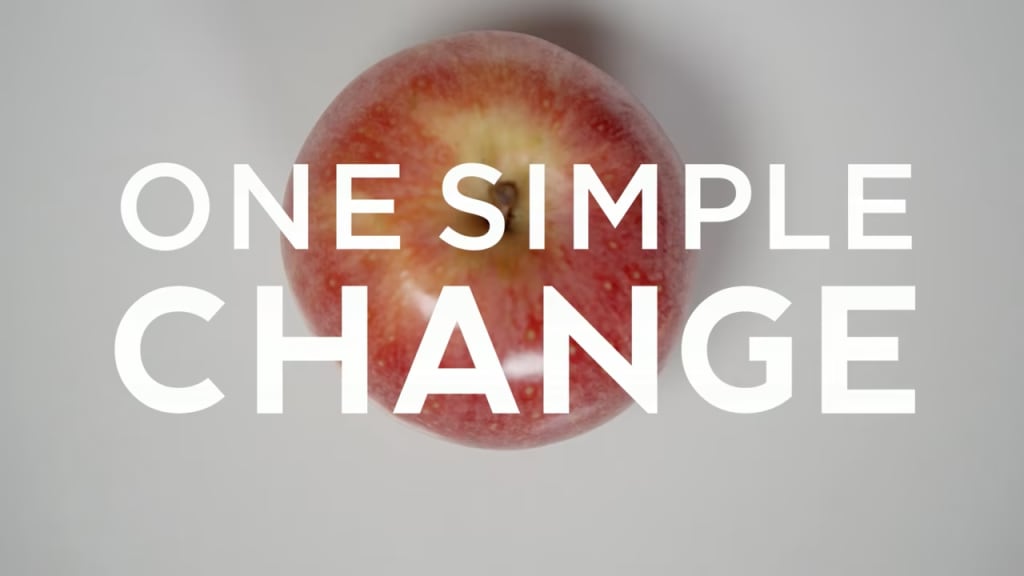
We all want to live a healthier, happier, and more fulfilling life. But with so much conflicting information out there, it can be challenging to know where to start. Fortunately, there is one simple change that can make a huge difference in your overall well-being: mindfulness.
What is mindfulness?
Mindfulness is the practice of being present in the moment, without judgment or distraction. It's about learning to be fully engaged in whatever you're doing, whether it's eating a meal, talking to a friend, or just walking down the street. By focusing your attention on the present moment, you can reduce stress, improve mental clarity, and cultivate a greater sense of peace and happiness.
The benefits of mindfulness

1.Reduced stress and anxiety
One of the most significant benefits of mindfulness is its ability to reduce stress and anxiety. When you're mindful, you're better able to manage your thoughts and emotions, which can help you feel more calm and centered even in challenging situations.
2.Improved focus and productivity
Mindfulness can also help you improve your focus and productivity. By training your brain to stay present in the moment, you can reduce distractions and improve your ability to stay on task. This can help you be more productive at work or school and can also improve your overall sense of satisfaction and accomplishment.
3.Greater emotional resilience
Another benefit of mindfulness is its ability to help you develop greater emotional resilience. By learning to be present with your emotions, you can develop a greater capacity for handling difficult emotions and situations. This can help you bounce back more quickly from setbacks and develop a greater sense of emotional balance and well-being.
4.Improved relationships
Mindfulness can also improve your relationships with others. By learning to be present and fully engaged in your interactions with others, you can deepen your connections and develop greater empathy and compassion. This can help you build stronger, more supportive relationships with friends, family members, and colleagues.
How to practice mindfulness

There are many different ways to practice mindfulness, and the key is to find what works best for you. Here are a few simple techniques to get started:
1.Mindful breathing
One of the most popular mindfulness techniques is mindful breathing. This involves focusing your attention on your breath as you inhale and exhale. You can do this anywhere, at any time, and it only takes a few minutes. As you breathe in, focus on the sensation of the air filling your lungs. As you breathe out, focus on the sensation of the air leaving your body. If your mind starts to wander, gently bring your attention back to your breath.
2.Mindful movement
Another way to practice mindfulness is through mindful movement. This can involve any physical activity, such as yoga, tai chi, or simply walking. The key is to focus your attention on the physical sensations of your body as you move. Notice the feeling of your feet on the ground, the movement of your muscles, and the sensation of your breath as you move.
3.Mindful eating
You can also practice mindfulness while you eat. Take a few moments to really savor each bite of food, noticing the texture, flavor, and aroma. Put down your fork or spoon between bites and take a few deep breaths. By slowing down and savoring your food, you can cultivate a greater sense of gratitude and appreciation for the nourishment it provides.
In conclusion, mindfulness is a simple but powerful tool that can help you improve your overall well-being. By learning to be present in the moment, you can reduce stress, improve focus and productivity, cultivate greater emotional resilience, and deepen your relationships with others. Whether you choose to practice mindfulness through breathing, movement, or eating, the key is to find what works best for you and make it a part of your daily routine. Over time, you'll find that mindfulness becomes more natural and automatic, and you'll experience the benefits more fully.
It's important to note that mindfulness is not a cure-all and should not replace professional medical or mental health care. If you're experiencing severe stress, anxiety, or other mental health concerns, it's essential to seek the help of a qualified healthcare professional.
In addition to individual practice, there are many mindfulness-based programs and therapies available, such as mindfulness-based stress reduction (MBSR) and mindfulness-based cognitive therapy (MBCT). These programs can provide more structured support and guidance for those looking to deepen their mindfulness practice.
Incorporating mindfulness into your daily life may take some effort and dedication, but the benefits are worth it. By practicing mindfulness regularly, you can cultivate a greater sense of calm, clarity, and happiness in your life. So why not give it a try and discover the surprising benefits of this one simple change?






Comments
There are no comments for this story
Be the first to respond and start the conversation.